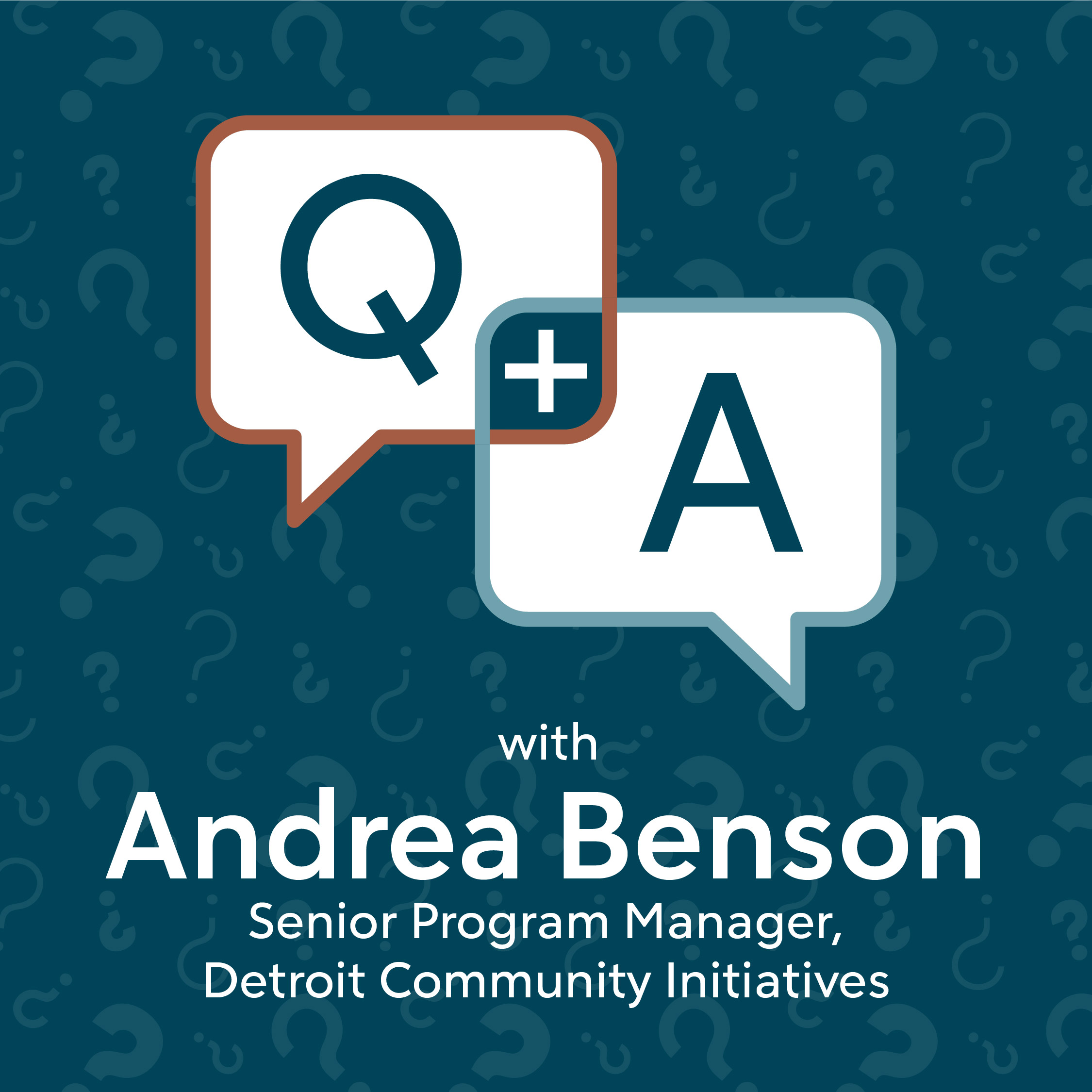Q&A with Andrea Benson
Building OpportunityDec 12, 2023

In this edition of our Q&A series, we talk with Andrea Benson, Senior Program Manager on the Detroit Community Initiatives team. Andrea has extensive experience working in urban planning which benefits our housing stability work in Detroit. Her experience as a Detroit Revitalization fellow at Wayne State University opened her eyes to the power of strategic philanthropy and has had a profound impact on her perspective. Andrea is also a passionate urban gardener and a board member of Detroit Horse Power, an organization focused on building empathy, skills and confidence for Detroit youth through horseback riding and animal care.

Q: What drew you to philanthropic work?
A: When I was a graduate student in urban planning, one of my professors encouraged me to work in various sectors touched by the planning industry to better understand partner perspectives that would in turn help navigate and execute the work. I took that to heart. For the past 18 years I have worked in academic, nonprofit, and government sectors and philanthropy has either been in the room or close by. I learned of the undeniable value philanthropy has in supporting the economic development of communities, and this inspired me to pursue roles in the philanthropic space. In many ways, I see working in philanthropy as an extension of my past work, but on a broader level, where I can address systematic challenges and larger social issues.
Q: You were a Detroit Revitalization Fellow at Wayne State University. How do you think that experience impacted your perspective on economic development in Detroit?
A: The fellowship was a great learning experience for me, because it introduced a wide variety of perspectives on community growth. For example, we explored both the good side of community and economic development and the less positive outcomes in various communities within and outside Detroit. By the end of my fellowship, I was able to better understand the nuances within this space from a more holistic standpoint, including the politics that shaped the outcomes. What I learned as a fellow continues to guide and inform my approach to the work today.
Q: What do you think are the biggest challenges to stabilizing housing in Detroit, and how can we work together to solve for these issues?
A: There are many multifaceted challenges to stabilizing housing in Detroit. Perhaps the biggest one is a history of limited access to educational and employment opportunities for residents, that are necessary, to establish a high-wage career and growth opportunities. Job stability equates to housing stability, because it provides individuals with a more reliable source of income to better set and maintain budgets – not to mention the ability to access housing resources when they are needed.
Currently there are many partnerships and programs that have been created to solve for this issue, including many developed by the Gilbert Family Foundation. But we must never get too comfortable with the status quo – we should always remain curious and be committed to solving the root causes of these challenges, regardless of the setbacks that can arise from this work. We should always be raising our level of awareness about opportunities that not only exist tomorrow, or next year, but decades from now. This also means pushing yourself and others to be wildly creative and brave enough to share potential solutions in the face of new challenges. It means
Q: How has your experience with Urban Planning supported you in your current role?
A: When I set out to get my degree in Urban Planning my goal was to work in a more traditional setting within the field, specifically for city government or HUD. However, I was a student during the recession – graduating in 2009 – so my work trajectory was altered and I found solace in nonprofit work. Lucky for me, I was familiar with the industry having worked in several internship and fellow positions as a student, and landed my first full-time position at Midtown Detroit Inc. My primary responsibility was managing the Live Midtown and Live Downtown programs which was in partnership with Rocket Mortgage (then known as Quicken Loans) as well as other major employers in Detroit.
This experience not only helped me learn about the various housing options in the Midtown and Downtown market, but also helped build my acumen for working across various partnerships and stakeholders. I was responsible for ensuring employers were updated on budgets and trends, program participants were able to access and complete applications on time, and landlords received payments. That role helped shape my flexible and creative approach to my current work. It inspired me to power through difficult moments and situations, contribute to the exploration and planning of new initiatives, and show up each day with as much gratitude possible.
Q: What excites you most about working for the Gilbert Family Foundation?
A: For me, people always make the place, so collaborating with brilliant, kind, driven colleagues every day is where it’s at. I am inspired by how we work towards solutions to large systemic problems. What seems daunting to most is a challenge accepted and worth solving within the organization. I’m also excited by the data-driven decision-making. I have 1001 ideas on how to solve 25 challenges and I’m comforted in knowing that through data, I can narrow down those ideas to a short list that really focus in on a potential solution based on what the data is telling. I know that when I present those ideas I’ll be met with curiosity and enthusiasm. Even if the idea doesn’t make it off the “shop floor” it feels good to feel appreciated and heard and that leaves me excited to jump back into the work each day. It also excites me that the Gilbert Family Foundation is committed to execution and being bold in their approach towards finding a better way. No one takes their job lightly and it shows, every day. That type of energy is invigorating!
Q: You’re a board member at Detroit Horse Power. What is that organization, and what drew you to that role?
A: I’m so proud to serve on the board of Detroit Horse Power – a nonprofit organization that introduces Detroit students to horse riding and care to reinforce critical skills necessary for success in all aspects of life, including academic and work environments. I was drawn to this organization because I believe in the power of exposing yourself to new and diverse opportunities as a means of sparking joy, creativity, growth, and potentially new relationships. I also love horses and was able to take lessons as a young person growing up in Detroit. The organization has built a strong, supportive network that welcomes students to their barns for riding lessons and education around horse and barn care. There’s also year-round classroom learning that ties together the skills learned in the barn with life skills such as responsible risk taking, empathy, perseverance, confidence, and self-control. To ensure accessibility to as many students as possible Detroit Horse Power is currently undergoing a capital campaign to raise funds to build an equestrian center in Detroit. We have made significant strides in reaching our goal and l look forward to the day when all Detroiters can visit the site. In the meantime, I encourage anyone that’s interest in exposing themselves to horses to join me at next year’s Midwest Invitational Rodeo in Belleville, MI. I had such a wonderful time attending with Detroit Horse Power students in 2021 that I’ve made it my mission to attend each year.
Q: We hear you’re a passionate gardener! Can you talk about your experience with urban gardening and Keep Growing Detroit?
A: I have been a part of Detroit’s urban gardening community for over a decade, when I first supported a colleague in maintaining the organization’s community garden. The garden hosted close to 100 resident and commercial gardeners. I found composting to be very therapeutic and learned about beekeeping – even securing my own beekeeping suit that I finally donated this year! I am a 2013 Urban Roots graduate of Keep Growing Detroit’s (KGD) Garden Leadership Program and have been a member of the Garden Resource Program since 2011. I continue to participate in educational and social programming within the organization. For example, I’ve been berry picking in northern Michigan, learned how to can tomatoes, participated in many of their volunteer opportunities, and dined with fellow gardeners in a community garden through KGD. I am also a proud, contributing member of the Detroit People’s Food Co-op which I learned about through this network. I still consider myself a novice gardener in many ways, but am so happy I found this community in Detroit. My family is happy too because they get to enjoy the (actual) fruits of my labor!